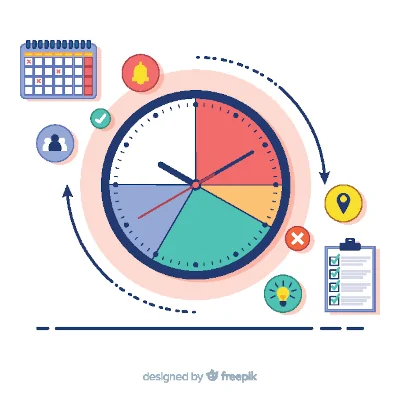The importance of time management
Time is one of the most valuable resources we have, yet it is also one of the most limited. We all have 24 hours in a day, and how we choose to use that time can make a significant difference in our lives. This is where time management comes in.
What is time management? It’s the process of planning and organizing how much time you allocate to different activities or tasks throughout the day. It involves setting goals, creating a schedule, and prioritizing tasks based on their importance and urgency.
The importance of time management cannot be overstated. Effective T.M. enables you to be more productive, achieve your goals, and reduce stress. When you manage your time well, you are better able to balance your work and personal life, and you can make the most of every minute.
For instance, when you manage your time well, you are less likely to feel overwhelmed by your workload. You are able to break down your tasks into manageable chunks and prioritize them based on their importance. This allows you to focus on what’s most important and achieve more in less time.
In addition, effective T.M. helps you to avoid procrastination. Procrastination is a common problem that can lead to missed deadlines, unfinished projects, and a sense of frustration and disappointment. When you manage your time effectively, you are better able to identify potential obstacles and take action to overcome them before they become a problem.
Assessing your current time management practices
Assessing your current time management practices is an important first step in improving your productivity and efficiency. Without a clear understanding of how you currently use your time, it can be difficult to identify areas for improvement and create an effective plan for managing your time.
To assess your current time management practices, start by keeping a time log. This involves tracking how you spend your time over the course of a week or two. Record the activities you engage in, the time spent on each activity, and any interruptions or distractions that occur.
Once you have a record of your time, review it to identify patterns and trends. Are there particular activities that take up more time than they should? Are you easily distracted by social media or other online activities? Do you spend too much time in meetings or responding to emails?
Based on your findings, you can start to develop a plan for improving your time management practices. This might involve setting priorities, scheduling specific times for particular tasks, eliminating distractions, and delegatng tasks to others when possible.
Remember, assessing your current time management practices is an ongoing process. As your priorities and responsibilities change, so too should your time management strategies. By regularly reviewing your practices and making adjustments as needed, you can stay focused, productive, and achieve your goals.

Identifying time-wasters and distractions
Identifying time-wasters and distractions is a critical step in effective time management. Time-wasters are activities that do not add value or contribute to achieving your goals, while distractions are external factors that divert your attention and cause you to lose focus.
To identify time-wasters and distractions, start by reflecting on your current habits and routines. Are there particular activities that you engage in that don’t provide any real value? Do you spend too much time on social media or other leisure activities? Are there external factors, such as emails or phone calls, that interrupt your work and cause you to lose focus?
Once you have identified potential time-wasters and distractions, you can take steps to minimize their impact on your productivity. This might involve setting limits on the amount of time you spend on non-essential activities, turning off notifications during focused work periods, or delegating certain tasks to others.
It’s also important to recognize that not all distractions are avoidable. Unexpected events and emergencies can arise, and it’s important to be flexible and adaptable when they do. However, by being proactive in identihfying and minimizing time-wasters and distractions, you can maximize your productivity and stay focused on your goals.
In conclusion, by taking the time to reflect on your habits and routines, you can minimize the impact of external factors and optimize your productivity.
Creating a prioritized task list
Creating a prioritized task list is an essential component of effective T.M.
When you have a clear understanding of the tasks that need to be completed and their relative importance, you can make the most efficient use of your time and ensure that you are working on the tasks that will have the greatest impact.
To create a prioritized task list, start by listing all the tasks that need to be completed. Next, assess each task in terms of its importance and urgency. Ask yourself, “What tasks need to be completed today, and which can wait until tomorrow or later in the week?”
Once you have identified the tasks that need to be completed first, organize your list in order of priority. This will allow you to focus your energy and attention on the tasks that will have the greatest impact, while also ensuring that you don’t waste time on tasks that can wait.
Finally, review your task list regularly to ensure that it remains up-to-date and reflects any changes in priorities or deadlines. By creating and maintaining a prioritized task list, you can optimize your time management and achieve your goals more efficiently.

Tracking your time and progress
Tracking your time and progress is an effective way to manage your time more efficiently and identify areas for improvement. By keeping track of how you spend your time, you can gain insights into your habits and patterns, and adjust your schedule accordingly.
One way to track your time is to use a time log or tracker. This can be as simple as writing down the tasks you complete and the time spent on each one, or using a more sophisticated tool such as a time tracking app. This information can then be used to identify areas where you may be wasting time or to estimate how long certain tasks take.
Tracking your progress is also important to ensure that you are making progress towards your goals. Set specific and measurable goals, and track your progress regularly. This will allow you to celebrate your successes and make adjustments if you are not making the progress you had hoped for.
Regularly reviewing your time log and progress tracker can help you identify patterns and areas for improvement. Use this information to adjust your schedule and habits, and to make better use of your time. By tracking your time and progress, you can optimize your time management and achieve your goals more efficiently.
Staying motivated and focused
Staying motivated and focused is a key component of effective time management. When you are motivated and focused, you are more likely to make progress towards your goals and use your time efficiently.
One way to stay motivated is to keep your goals in mind. Remind yourself regularly of why you are working towards these goals and the benefits you will gain from achieving them. This can help you stay focused on the tasks at hand and avoid distractions.
Another way to stay motivated is to break down your goals into smaller, manageable tasks. This can help you feel a sense of accomplishment as you make progress towards your goals, and can help you avoid feeling overwhelmed.
It is also important to take care of your physical and mental health. Ensure that you are getting enough sleep, eating a healthy diet, and taking breaks throughout the day to recharge . This can help you maintain your focus and energy levels.
Finally, surround yourself with supportive and positive people. Share your goals with friends and family members who will encourage you and help keep you accountable. This can help you stay motivated and on track.
By staying motivated and focused, you can make the most of your time and achieve your goals more efficiently. Remember to keep your goals in mind, break them down into manageable tasks, take care of your health, and surround yourself with positive influences.

Overcoming obstacles and challenges
Overcoming obstacles and challenges is an inevitable part of life, and it is important to develop strategies for managing these difficulties. When it comes to time management, there are several obstacles that can arise, including procrastination, distractions, and unexpected interruptions.
To overcome procrastination, it can be helpful to break tasks down into smaller, more manageable steps. Set specific deadlines for each step and hold yourself accountable for meeting them. Additionally, try to identify the root cause of your procrastination and address it directly. For example, if you are avoiding a task because it is overwhelming, try breaking it down into smaller tasks or seeking assistance from others.
Distractions can also be a major obstacle to effective time management. To overcome distractions, consider using tools such as noise-cancelling headphones or productivity apps that limit your access to social media and other distractions. It can also be helpful to create a designated workspace that is free from distractions.
Unexpected interruptions, such as phone calls or unexpected tasks, can also be challenging to manage. To overcome these obstacles, it is important to be flexible and adaptable. Consider incorporting buffer time into your schedule to account for unexpected interruptions, and be prepared to adjust your priorities as needed.
Effective strategies for managing your time
Effective time management is essential for achieving your goals and maintaining a healthy work-life balance. Incorporating these techniques into your daily routine can take time and effort, but the benefits are worth it.
Here are some strategies that can help you manage your time more effectively:
- Set clear goals: Without a clear understanding of what you want to achieve, it can be difficult to prioritize your time effectively. Take the time to set clear and specific goals that align with your values and priorities.
- Start small: Begin by implementing one or two time management techniques at a time. This can help you focus on developing new habits without feeling overwhelmed.
- Prioritize: Determine which tasks are most important and prioritize them. This can help you focus on what is truly essential and avoid getting bogged down by less important tasks.
- Create a schedule: Once you have set your goals, create a schedule that allows you to work towards them in a systematic and organized way. Block out time for important tasks and set deadlines to keep yourself accountable.
- Minimize distractions: Distractions can significantly impact your productivity and hinder your ability to manage your time effectively. Consider turning off notifications on your phone or email, or finding a quiet space to work in.
- Learn to say no: Saying yes to every request or invitation can quickly lead to a packed schedule and leave you feeling overwhelmed. Learn to say no to non-essential activities or delegate tasks when possible.
- Avoid multitasking: While it may seem efficient to tackle multiple tasks at once, multitasking can actually be counterproductive. Instead, focus on one task at a time and give it your full attention.
- Take breaks: While it may seem counter intuitive, taking breaks can actually increase your productivity and focus. Schedule regular breaks throughout your day to recharge and refocus.
- Use technology to your advantage: There are many time management tools (here a free selection) and apps available that can help you track your time, prioritize tasks, and manage your schedule. Consider using these tools to streamline your workflow and stay organized, this can help you manage your time more efficiently and avoid forgetting important tasks.
- Review and adjust: Regularly review your schedule and time management techniques to identify what is working and what is not. Make adjustments as needed to ensure that you are using your time efficiently.
Remember, effective time management is a continuous process that requires ongoing reflection and adjustment. By incorporating these strategies into your daily routine, you can optimize your productivity and achieve your goals more efficiently.

The benefits of mastering time management
Mastering time management can have a multitude of benefits, both personally and professionally. One of the main benefits is increased productivity. By effectively managing your time, you can accomplish more in less time, freeing up valuable time for other tasks or activities. This can lead to reduced stress and increased feelings of accomplishment.
Another benefit of mastering time management is improved decision-making. By prioritizing your tasks and managing your time effectively, you can make more informed decisionx about how to spend your time and what tasks to prioritize. This can lead to better overall decision-making and a greater sense of control over your life.
Effective time management can also lead to improved work-life balance. By managing your time effectively, you can ensure that you are devoting adequate time to both work and personal pursuits. This can lead to reduced stress, increased happiness, and improved overall well-being.
Finally, mastering time management can lead to increased success and achievement. By effectively managing your time, you can accomplish your goals more efficiently and effectively, which can lead to greater success and achievement in both your personal and professional life.
Overall, mastering time management is a valuable skill that can have numerous benefits. By increasing productivity, improving decision-making, achieving a better work-life balance, and increasing success and achievement, effective time management can help you to live a more fulfilling and successful life.
Conclusion
We hope this article can help you in your time management, however, if you feel that you need more personalized guidance and support, a professional coach provided by us can be an excellent resource.
Our coaches can work with you one-on-one to identify your specific time management challenges, develop a customized plan to address them, and provide ongoing guidance and accountability to help you stay on track.
So, whether you choose to follow the tips outlined in this article or work with one of our coaches, remember that effective time management is a valuable skill that can help you achieve your goals, reduce stress, and improve your overall quality of life.



